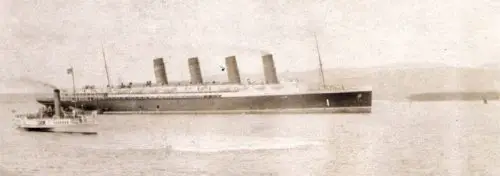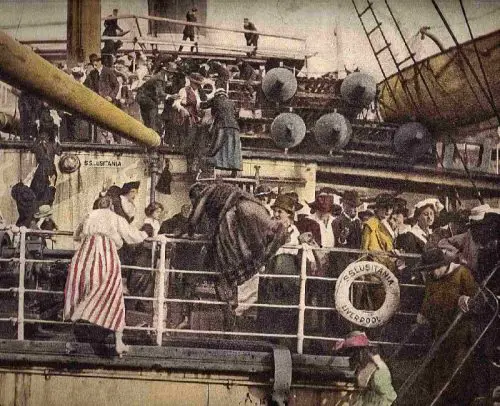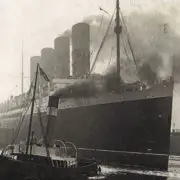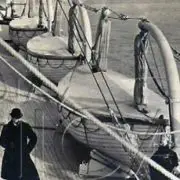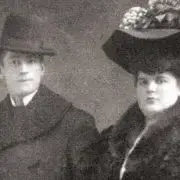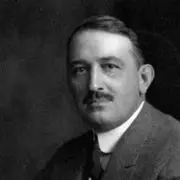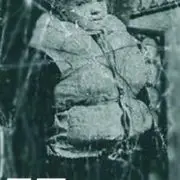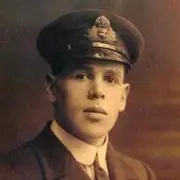The Price of Fame
Rose Ellen Murray, the Lusitania‘s Titanic Survivor
Rose Ellen Murray, of Dublin and Philadelphia, became a minor celebrity after she survived the Lusitania disaster. However, her celebrity proved to be her undoing twenty years after the vessel was destroyed.
Mrs. Murray’s longest account from 1915 contains the same blend of fact and fallacy that typified her later interviews. The key points coordinate with the details contained in her brother’s account, yet there is the occasional excursion into the realm of pure storytelling.
I left the saloon and went up to the lounge, where I took off my coat and sat down. I had no sooner sat down than we got the first, awful, shock. the boat lifted right up on one side, and the people all rolled off their seats on to the floor.
I got outside and into a lifeboat, but I had no lifebelt on. A minute or so passed, and my brother came rushing up with two belts- one for me and one for himself.
He put the lifebelt on me, and then the captain ordered everybody out of the lifeboat. We got on deck again, and immediately afterward the second torpedo struck. it was awful. I remember seeing the four funnels fly clean out of the ship. My brother said ‘My God! We have got to go to a watery grave after all!’
We scrambled into the lifeboat again, but then the boat tumbled over and everybody was thrown into the water. I went down head foremost, and my brother fell with me. I thought I was lost, but I came up to the surface again, and the lifebelt kept me up.
I paddled around for a little while, and then caught hold of an oar, and hung on to it for an hour.
I shall never forget my experiences in the water. All those bodies! My clothes were torn off me, as I got caught in the wreckage and the bodies, and I became unconscious. I was picked up by a lifeboat, and we were towed to Queenstown, where they carried me on a stretcher to the Queen’s Hotel. A doctor attended to me, and about three in the morning I recovered consciousness.
I was anxious about my brother, and could hear nothing of him. There were 200 dead bodies in the Queen’s Hotel, and survivors seemed to be in every room. Some had lost their arms, and some their legs,while one poor girl’s eye was terribly injured.
About seven o’clock in the morning I went down to the morgue to look for my brother but could not find him, and they brought me back to the hotel, where I again became unconscious. I got out on the street again, and went to get some clothes, and I was just passing the Cunard offices when i saw my brother. I became hysterical, and when he saw me he was almost hysterical too.
We had both thought we should never see each other alive again. We were happy after that. The people at Queenstown were more than nice. They couldn’t do enough for us, it seemed. We left Queenstown at 3 o’clock on Saturday afternoon, and arrived at Belfast at ten minutes past midnight.
Rose Ellen was the wife of a U.S. Naval officer, Christopher Murray. She loved ships and travel, and crossed the Atlantic at least fifteen times between 1910 and 1926. She would claim, in press releases, 34 crossings, a number which remained constant between 1925 and 1932, despite other voyages made in the interim.
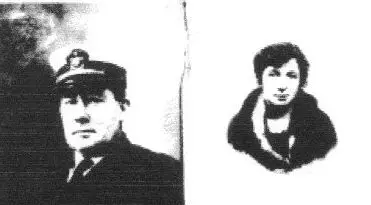
Christopher Murray and Rose Ellen Murray
Mrs. Murray’s frequent appearances in the papers hinged on her claims of being a survivor of both the Titanic and Lusitania disasters. She would tell eager reporters of her long wait for the Carpathia, and of her hours spent atop an overturned Lusitania lifeboat. The latter, at least, could be proved true. She had jumped from the sinking liner and been saved from atop a lifeboat, as had her brother, Patrick Ginley. Mrs. Murray was a good sport, gave great quotes about how she loved “the sea to the extent that she cannot now sleep on land” …and if her Titanic story seemed sparing in details compared to her Lusitania account, no one questioned. She was also aboard the Celtic when that liner was involved in a minor collision and apparently added that tale to her recitation at some point.
Mrs. Murray maintained a home for her husband and two of her brothers on South Circular Road, in Dublin.
One day, in July 1935, Mrs. Murray was accosted at her home by three young women who said that they were there to escort her to a mental institution. Mrs. Murray refused to go with them and, instead, went to The Four Courts in Dublin, in order to discuss the situation with her lawyer and to instigate legal proceedings against an unnamed party. She met the three women again, while she was still in the Four Courts Building. A scene ensued when Mrs. Murray learned that they had been sent to take her to Verville, a private mental hospital, She was forced to her knees and her arms restrained. The women pulled Rose Ellen into a taxi with great difficulty, and brought her to the facility. She remained in Verville from July 5, 1935 through October 10th.
Mrs. Murray was released after a sanity hearing determined that she was sane and capable of maintaining her own affairs. Incredibly enough, it seems that someone used Mrs. Murray’s frequently told Titanic, Lusitania and Celtic stories, and an incident in which Rose Ellen had been blackmailed over some indiscretion, to have her committed. The doctors at Verville had been told that Mrs. Murray was delusional and ranted about being a survivor of multiple disasters. She proved by affadavit and other evidence, that all four claims were partially true and not melancholy ravings, and was released. The identity or identities of whoever had her committed was not made public, but the fact that Mrs. Murray thereafter lived apart from her husband and brothers seems to point a finger.
Her actual Titanic story, as sworn in court, was that she was supposed to have been aboard the ship, but did not sail due to a missed train. This was far different than the tale told to the pier side press in NYC and Boston, and could conceivably be true.
Mrs. Murray sued Dr. Sullivan, of Verville, in November 1939, claiming that she had been falsely committed, and was physically assaulted by another patient while in the hospital. She had been punched in the face, driving her eyeglass in to her eye, and when she complained was told that she had to learn to watch out for herself when “in a place like this.” The jury found in favor of Doctor Sullivan in December, stating that Mrs. Murray had been legally committed with papers filed June 28, 1935, and that the assault was not due to specific negligence on his part.
Rose Ellen Murray was found dead on the floor of her home at Merrion Square, Dublin, on January 12, 1942. She was 62 years old. Rose left an estate of three thousand five hundred pounds. Her husband and three brothers were bequeathed fifty pounds each, and the bulk of her money went to charity. Her brothers opposed the will, and in July 1942 were each granted an additional two hundred pounds. Her husband, still in naval service, wrote the court to say that he in no way wanted to interfere with his late wife’s wishes.
I love the sea. It’s strange. When I’m on land I’m all nerves. Often I can’t sleep. Time after time, I live through it all again. When I’m at sea, I forget it all.
I remember that Rita Jolivet and I had been taking up a collection for the ship’s musicians. My brother rushed to me with a life belt.
The ship was about to stand on end. I leaped from one of its highest decks. An old man caught me by the hair. He was clinging to some wreckage. In a few moments, he went under.
I swam to an overturned lifeboat, and crawled across it. I lost consciousness.
They wrapped me in a blanket and took me to a hotel in Queenstown. There someone gave me a pair of pajamas.
I took a train that afternoon to my old home in Belfast. Still wearing the pajamas, without shoes or socks.
Rose Ellen Murray; disembarking from the Caronia. NYC, 1926.
Patrick McGinley, Rose Murray’s brother, was formerly a teacher at St. Gall’s National School, Clonard. He had been an employee of Park and Telford in New York City for five years as of May 1915, and was returning to Belfast for his first visit home since emigrating:
I had lunched at the first table at one o’clock, and then I came on deck and chatted with a gentleman friend. Everyone around was in the best of spirits.
Shortly after two o’clock as I was still talking to my friend, I noticed a white object about 100 yards off on the land side. It was directly at right angles to the liner. I called my friend’s attention to it, and he said “That appears to be a periscope.”
I saw a white streak coming towards the vessel. “My God, there’s a torpedo” exclaimed my friend. I saw it come quickly through the water until it struck the ship, which shook like a reed in the wind and heaved to one side.
Everyone was rushing to and fro and there was a good deal of excitement but not all that much under the circumstances. The people got into the boats as quickly and with as little crushing as possible. When they had been there for about five minutes, an order came from the captain, indirectly, that the passengers should leave the boats as everything was safe and they were going to make for land.
I at once went down to my stateroom and secured two lifebelts, thinking they were the best thing in the circumstances. On coming up, I fixed one on my sister, Mrs. Murray, who was already in a lifeboat and I fastened the other on myself. I remained in the boat, which contained about one hundred people. Orders were then given to lower all the boats quickly, as the ship was sinking very fast.
Something went wrong with the pulley on the boat in which we were, and a young man cut the ropes thinking, of course, that the boat would fall on its keel in the water. Instead of that, however, it turned upside down and we were all precipitated headlong into the water.
I went down ever so far in to the sea, and at last I began to rise again. On coming up, I felt something resting on top of my head, and on putting up my hand I discovered it was the upturned boat from which we had fallen. With great difficulty, I managed to get from under it, and I then started swimming around in the hope of finding my sister. I could find no trace of her, though bodies were drifting past me all the time.
In the meantime, the Lusitania had disappeared.
After I had been swimming for a considerable time, I managed to get onto a raft and drifted for about half a mile. I saw a lifeboat upside down and with about forty people clinging to her, and I thought if I could get to that boat I should be alright. I sprang from the raft and swam the one hundred fifty yards which separated me from the boat, and I was dragged aboard.
We were on that boat almost an hour- seven women and the rest all men. One of the men had his arm torn almost completely off, and a young man severed it for him with a pocket knife.
As we were floating about, I saw a lady and a gentleman clinging to a piece of raft and coming in our direction. When they came near the boat, the lady lifted one hand and said “For God’s sake, save me!” One man on the boat said “If you bring any more on the boat, it will go down” I said “We can’t see people drown, let’s get them on!” Mr. Wyle, a steward, and I helped the lady on, and also the man. The lady, it afterwards transpired, was Lady Allan.
Patrick McGinley died in 1951, at Cathcart, Scotland.

